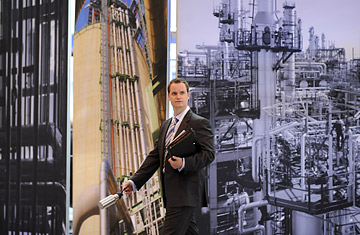
A participant walks past a banner at the 19th World Petroleum Congress in Madrid
In a week when oil prices shot to $143 a barrel, the mood at the World Petroleum Congress in Madrid is surprisingly somber. Perhaps the oil company CEOs and OPEC ministers, gathered for the biggest conference in the industry's calendar, are feeling besieged by the relentless drumbeat of public outrage. Perhaps they have been worn down by their ongoing efforts to blame each other for spiraling prices. Or maybe they just think it in poor taste to gloat about their record profits. But even Monday's news that Iraq would open six of its oil fields to international contracts — news that came just hours after Royal Dutch Shell president Jeroen van der Veer announced to the congress that such a deal was "weeks, not months" away — failed to lighten the mood.
"There's a clear sense of urgency here," says Nobuo Tanaka, director of the International Energy Agency. "The oil burden is going to keep rising to levels of the last oil shock, in the 1970s. There's a sense now that this is a shared problem."
Maybe so, but that didn't prevent the key industry players from pointing fingers at each other. At Monday's opening plenary, British Petroleum CEO Tony Hayward called the suggestion that speculation was behind the doubling of crude prices in the past year a "myth," and instead blamed geopolitics, a decline in Russian production and increased demand for the crunch. "Supply is not responding adequately to rising demand," he said. "The problem is above ground, not below it." ExxonMobil CEO Rex Tillerson echoed the last part of Hayward's equation: "Look, it's hard for us to fully understand what's behind the high prices — there's a decoupling from historic indicators. But clearly, demand is driving it."
The OPEC Conference president, Chakib Khelil, however, insisted that producing countries — or at least OPEC members — were mainly free from responsibility. "It's not an issue of supply," says Khelil. "I'd estimate that $45 of the price comes from speculation, from the U.S. subprime crisis, from the weak dollar. Most of the price comes from the dollar's devaluation."
Like the long line of chauffeured Mercedes waiting outside a conference whose purported theme is "sustainability," that isn't the only contradiction at the World Petroleum Congress. Although some industry experts have suggested that peak oil is near or at hand, many at the conference insisted that future supplies were adequate. "The question is not whether we are to going to achieve the next trillion barrels," said SaudiAramco's Muhammed Saggaf at a panel dedicated to the subject. "The question is where it's going to come from."
Even the general agreement on the need for more investment to answer that question came with its own polemics. "Exxon will spend $1.25 billion on research," said ExxonMobil CEO Rex Tillerson. "My company alone is investing at a rate of 60% of OPEC's." But asked what the OPEC was investing to secure future demand, Khelil responded by suggesting his organization was being unfairly targeted. "What are other countries doing? Why don't you ask Brazil? Why don't you ask China? Those aren't OPEC countries," he said. Meanwhile, BP's Hayward blamed high taxes for stymieing necessary investment.
The one clear point of accord was that the era of cheap energy is over. On Tuesday, the IEA released its medium-term oil market report at the congress, predicting a lessening of demand in the coming 18 months, but an increase after that. "There will be short-term improvement," says Tanaka, "but after that there will be a tighter market until 2013. Demand will go back up in 2010, and although the supply side is growing, it's not as much as we want to see."
Which means prices will almost certainly remain high — as will pressure on the industry. As delegates toured the Madrid exhibition hall, where beautiful Venezuelan girls in tight white suits handed out ballpoint pens, and men in business suits drank lemonade at the SaudiAramco "bar," a small crowd gathered at the Qatari booth, made up to look like a Bedouin tent. A band of thobe-clad Qatari musicians emerged, singing and dancing joyfully. The applause was desultory.
